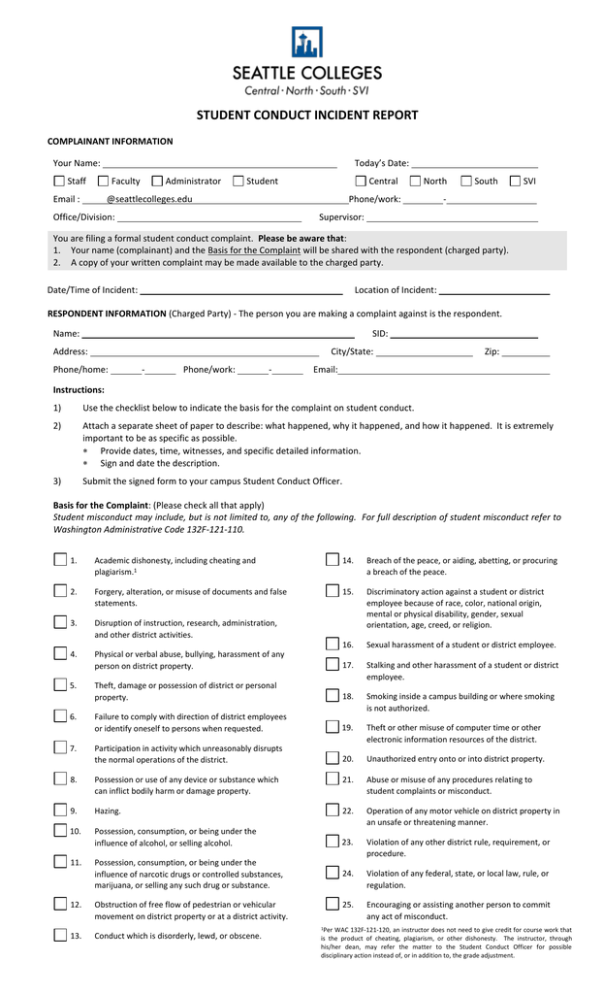
STUDENT CONDUCT INCIDENT REPORT
COMPLAINANT INFORMATION
Your Name:
Today’s Date:
Staff
Faculty
Email :
Administrator
Student
@seattlecolleges.edu
Office/Division:
Central
North
Phone/work:
-
South
SVI
Supervisor:
You are filing a formal student conduct complaint. Please be aware that:
1. Your name (complainant) and the Basis for the Complaint will be shared with the respondent (charged party).
2. A copy of your written complaint may be made available to the charged party.
Date/Time of Incident:
Location of Incident:
RESPONDENT INFORMATION (Charged Party) - The person you are making a complaint against is the respondent.
Name:
SID:
Address:
City/State:
Phone/home:
-
Phone/work:
-
Zip:
Email:
Instructions:
1)
Use the checklist below to indicate the basis for the complaint on student conduct.
2)
Attach a separate sheet of paper to describe: what happened, why it happened, and how it happened. It is extremely
important to be as specific as possible.
Provide dates, time, witnesses, and specific detailed information.
Sign and date the description.
3)
Submit the signed form to your campus Student Conduct Officer.
Basis for the Complaint: (Please check all that apply)
Student misconduct may include, but is not limited to, any of the following. For full description of student misconduct refer to
Washington Administrative Code 132F-121-110.
1.
Academic dishonesty, including cheating and
plagiarism.1
14.
Breach of the peace, or aiding, abetting, or procuring
a breach of the peace.
2.
Forgery, alteration, or misuse of documents and false
statements.
15.
3.
Disruption of instruction, research, administration,
and other district activities.
Discriminatory action against a student or district
employee because of race, color, national origin,
mental or physical disability, gender, sexual
orientation, age, creed, or religion.
16.
Sexual harassment of a student or district employee.
4.
Physical or verbal abuse, bullying, harassment of any
person on district property.
17.
Theft, damage or possession of district or personal
property.
Stalking and other harassment of a student or district
employee.
18.
Failure to comply with direction of district employees
or identify oneself to persons when requested.
Smoking inside a campus building or where smoking
is not authorized.
19.
Participation in activity which unreasonably disrupts
the normal operations of the district.
Theft or other misuse of computer time or other
electronic information resources of the district.
20.
Unauthorized entry onto or into district property.
5.
6.
7.
8.
Possession or use of any device or substance which
can inflict bodily harm or damage property.
21.
Abuse or misuse of any procedures relating to
student complaints or misconduct.
9.
Hazing.
22.
10.
Possession, consumption, or being under the
influence of alcohol, or selling alcohol.
Operation of any motor vehicle on district property in
an unsafe or threatening manner.
23.
Violation of any other district rule, requirement, or
procedure.
24.
Violation of any federal, state, or local law, rule, or
regulation.
25.
Encouraging or assisting another person to commit
any act of misconduct.
11.
Possession, consumption, or being under the
influence of narcotic drugs or controlled substances,
marijuana, or selling any such drug or substance.
12.
Obstruction of free flow of pedestrian or vehicular
movement on district property or at a district activity.
13.
Conduct which is disorderly, lewd, or obscene.
1Per
WAC 132F-121-120, an instructor does not need to give credit for course work that
is the product of cheating, plagiarism, or other dishonesty. The instructor, through
his/her dean, may refer the matter to the Student Conduct Officer for possible
disciplinary action instead of, or in addition to, the grade adjustment.
Nature of complaint/problem
Prior action you have taken
Complainant’s Signature
Date
® June 2014

